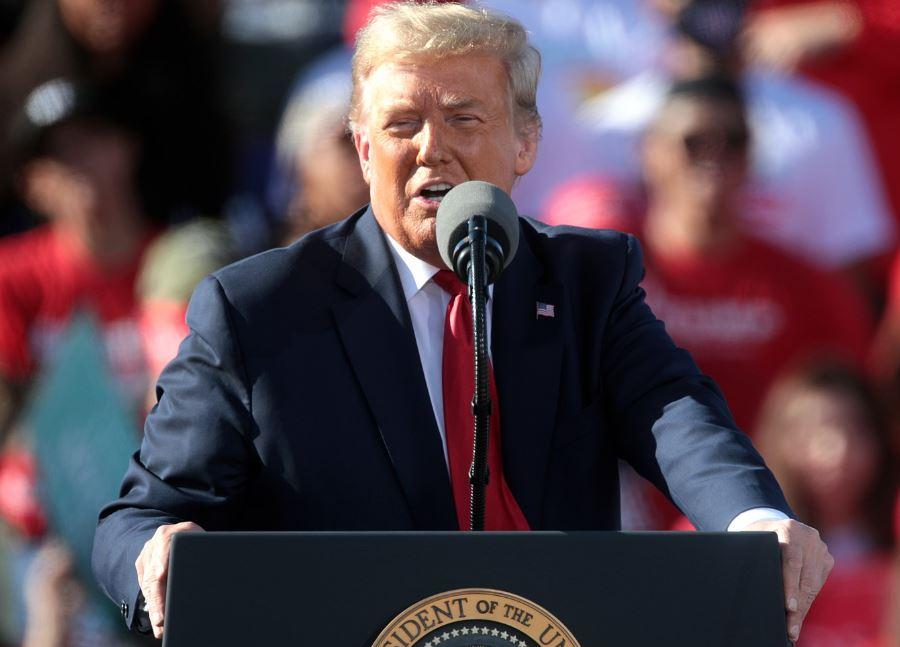
“Coup” Means Whatever the Regime Wants It to Mean
In the immediate aftermath of the January 6 riot at the US Capitol, many pundits and politicians were eager to describe the events of that day a s a coup d’etat in which the nation was “this close” to having some sort of junta void the 2020 election and take power in Washington.
The headlines at the time were unambiguous in their assertions that the riot was a coup or attempted coup. For example, the riot was “A Very American Coup” according to a headline at the New Republic. “This Is a Coup” insists a writer at Foreign Policy. The Atlantic presented photos purported to be “Scenes from an American Coup.”
This general tactic has not changed since then. Just this month, for example, Vanity Fair referred to the January 6 riots as “Trump’s attempted coup” Last month, Vox called it “Trump’s cuckoo coup.” Moreover, anti-Trump politicians have repeatedly referred to the riot as a coup, and “attempted coup” has become the standard term of choice for the January 6 panel.
At the time, it was obvious that if the riot was a coup at all, it failed utterly. Thus, the debate is now over whether or not it was an attempted coup. On January 8, 2021, I argued the riot was not an attempted coup. Now, 18 months later, after months of “investigation” and testimony to the January 6 committee, we’ve learned new details about the events that occurred that day. And now I can say with even more confidence: the January 6 riot was not an attempted coup.
It was not an attempted coup because it simply wasn’t the sort of event that historians and political scientists—the people who actually study coups—generally define as a coup. Even the Justice Department admits that virtually all of the rioters were, at most, guilty only of crimes such as trespassing and disorderly conduct. Among the tiny minority of those charged with actual conspiracy—11 people— they lacked any sort of institutional backing or support that is necessary for a coup attempt to take place.
Nor is this just some meaningless debate over semantics. Words matters and definitions matter. This should be abundantly clear to anyone in our current age of debates over what terms like “recession” or “vaccine” or “woman” mean. In fact, the use of term “coup” has been thoroughly weaponized in that outside academic circles it is employed largely as a pejorative to discredit political acts designed to register discontent with a ruling regime or to oppose a ruling coalition. For many, the term coup is now used increasingly to describe political acts one doesn’t like. But if the term “coup” ultimately means “political thing those bad guys did” then it ceases to have any precise meaning at all. But, the use of the term in this way does explain why so many pundits and politicians routinely use the term to label their opponents coup plotters. It’s basically name calling, and really only tells us about the user’s political leanings.
What Is a Coup?
In their article for the Journal of Peace Research, “Global Instances of Coups from 1950 to 2010: A New Dataset,” authors Jonathan M. Powell and Clayton L. Thyne provide a definition:
A coup attempt includes illegal and overt attempts by the military or other elites within the state apparatus to unseat the sitting executive.
Although the terms “military” and “coup” are routinely employed together, Powell and Thyne emphasize military involvement at early stages is not necessary:
[Other definitions] more broadly allow non-military elites, civilian groups, and even mercenaries to be included as coup perpetrators. This broad definition includes four sources, including [a definition stating that coup] perpetrators need only be ‘organized factions’. We take a middle ground. Coups may be undertaken by any elite who is part of the state apparatus. These can include non-civilian members of the military and security services, or civilian members of government.
Moreover, it is not necessary that violence actually be used. The presence of a threat issued by some organized group of elites is sufficient.
This definition is helpful because there are many types of political actions that are not coups, even if the intended outcome is a change in the ruling regime. The definition offered by Powell and Thyne is useful because it avoids “conflating coups with other forms of anti-regime activity, which is the primary problem with broader approaches.”
For example, popular uprisings that force ruling executives from power are not generally coups. Intervention by a foreign regime is not a coup. Civil wars initiated by non-elites or other outsiders are not coups.
Why the Jan 6 Riot Was Not a Coup
In the case of the January 6 riot, the rioters had no institutional backing, no promises of help from elites, and no reason to assume they had access to any coercive tools necessary to seize and hold control of a state’s executive apparatus. Nor was Donald Trump even in a position to promise such things. As noted by Elaine Kamarck at the Brookings Institution:
we now know that Trump did not even have the support of his own family and friends nor his handpicked White House staff. To pursue his plans, he had to rely on a close group of advisors known as “the clown show” led by Rudi Giuliani, a pillow manufacturer, and a dot-com millionaire—none of whom was in government and none of whom controlled the most important “assets” (guns, tanks, planes etc.) needed to take over a government. In contrast to most successful coups in history, Trump had no faction of the military, no faction of the National Guard, and no faction of the District of Colombia Metropolitan Police at his disposal.
In other words, the rioters had no avenue to calling upon any faction of the state or group of elites to secure backing. Kamarck continues:
As we learned in some of the most recent hearings, it was Vice President Mike Pence who was in contact with the military and the police, and most importantly, the military and the police were taking orders from Pence not Trump, the commander in chief!
Given that Trump didn’t attempt to actually attempt to secure any government agency to secure power for himself, we can guess Trump knew no branch of the federal government was about to step in to illegally secure an extension to his tenure as president. We can never know for sure what Trump was really thinking on that day, but even if Trump sought to encourage a group of protestors to somehow put pressure on Congress—even if by violent means—that’s not a coup. It’s a popular uprising.
The Bolivian “Coup”: The Anti-Morales Protestors in Bolivia
The protests that followed the 2019 elections in Bolivia provide an interestingly similar case to the January 6 riot and demonstrate that it’s often quite debatable as to what constitutes a coup.
As the Bolivian election neared its end on October 24, sitting president Evo Morales began to claim victory. Numerous opponents, however, claimed Morales’s supporters had engaged in electoral fraud. Both sides refused to accept the results of the election, and protests and riots soon erupted across the nation. Morales and his supporters accused the opposition of staging a coup. The opposition accused Morales of the same. Or, more precisely, they accused Morales of attempting an “autocoup”—autogolpe in Spanish—in which Morales was attempting to hold on to power via illegal means.
Ultimately, Morales ended up resigning after he failed to maintain control over the police and military. High ranking officials from those institutions “recommended” Morales resign, and Morales did so soon after. Morales went into exile and Mexico and the opposition became the de facto governing coalition in Bolivia.
There remains no agreement, however, as to whether or not the actions of either side in Brazil constituted a coup (or autocoup.) Morales’s supporters—mostly leftists—refer to the political crisis following the election as a coup. Those who are convinced Morales did indeed lose the election refer to his efforts as an autocoup. But many also refer to the events as a popular uprising.
For many, the situation in Bolivia in 2019 remains ambiguous, and we can see how it shares many elements in common with the events surrounding the January 6 riot at the Capitol. It began with claims of election fraud, and ended with a group of protestors attempting to pressure congress to change the outcome. This is not fundamentally different from the popular uprisings in Bolivia, except that in the US the outcome was never really dubious. There was never really any doubt as to whether the Pentagon would he helping Trump push through an autocoup. Trump never had any real reason to believe he could hold on to power, even with 900 mostly unarmed protestors trespassing in the Capitol.
“Coup” Now Means “Thing I Don’t Like”
The Bolivia situation also helps to illustrate how the term “coup” is used selectively for political effect. The fact that Morales’s leftist supporters are generally those who favor the use of the term to describe Morales’s removal from office is no coincidence. Those who support one side say it’s a coup, while the other side does not.
We see the same dynamic at work in the US, and we should not be surprised that the media has rushed to apply the term to the riot. This phenomenon was examined in a November 2019 article titled “Coup with Adjectives: Conceptual Stretching or Innovation in Comparative Research?,” by Leiv Marsteintredet and Andres Malamud. The authors note that as the incidence of real coups has declined, the word has become more commonly applied to political events that are generally not coups. But, as the authors note, this is no mere issue of splitting hairs, explaining that “The choice of how to conceptualize a coup is not to be taken lightly since it carries normative, analytical, and political implications.”
Increasingly, the term really means “this is a thing I don’t like.” It’s clear the January 6 panel in Congress, and countless anti-Trump pundits use the term in this way to express disapproval and also to justify regime crackdowns against pro-Trump opponents of the regime. It’s easier to justify harsh prison sentences for a disorganized group of vandals if their acts can be framed as a nearly successful coup and therefore a threat to “our democracy.” Moreover, if the situation were reversed, and if protestors invaded the Capitol to support a leftwing, pro-regime candidate, we can be sure that the vocabulary used to describe the event in the mainstream press would be quite different.



